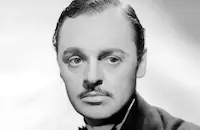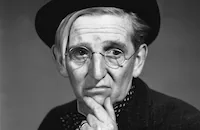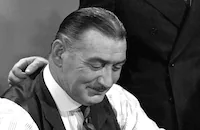Out of the Fog

Brief Synopsis
Cast & Crew
Anatole Litvak
John Garfield
Ida Lupino
Thomas Mitchell
Eddie Albert
George Tobias
Film Details
Technical Specs

Synopsis
Near Sheepshead Bay in Brooklyn, tailor Jonah Goodwin and short order cook Olaf Johnson find solace after work in fishing from their small boat. The men dream of buying a larger boat that would allow them to leave behind their jobs and responsibilities and fish in the Gulf Stream. Jonah's daughter Stella is engaged to George Watkins, an auctioneer on the pier, but she is tired of George's modest plans for the future. When Harold Goff, a petty gangster, notices her, she is more than willing to drop George in his favor. Unknown to Stella, however, Goff has demanded five dollars a week in "protection" money from Olaf and her father. To ensure that Jonah and Olaf will not turn him in to the police, Goff forces them to sign a paper stating that the money they give to him is in payment of a debt. Later, Goff uses their five dollars to buy perfume for Stella. In order to separate Stella from Goff, Jonah offers to send her on a cruise to Cuba using the money he and Olaf have saved to buy the larger boat. When Goff learns about the money from Stella, he offers to take her to Cuba himself and then demands that Olaf and Jonah give him their savings. Furious, Jonah turns Goff over to the police, but he shows the judge the I.O.U. that the two men signed and the judge dismisses the case. When Stella tells her father that she is going to Cuba with Goff, Jonah and Olaf plot to kill him. They lure Goff on to their boat, planning to knock him unconscious and throw him overboard, but at the last minute, Olaf is unable to attack Goff. Unexpectedly, however, Goff falls overboard and drowns. Later, Jonah finds Goff's wallet in the bottom of the boat with their savings still in it. After Goff's body is found, the police search Jonah and Olaf, looking for the missing wallet. They find nothing, as Jonah has hidden the wallet in the water. After the police leave, Jonah fishes it out of the sea and invites a contrite Stella to accompany him and Olaf on their fishing trip in the Gulf Stream.

Director

Anatole Litvak
Cast

John Garfield

Ida Lupino

Thomas Mitchell

Eddie Albert

George Tobias

John Qualen

Aline Macmahon

Jerome Cowan
Odette Myrtil

Leo Gorcey
Robert Homans

Bernard Gorcey

Paul Harvey
Charles Wilson

Jack Mower
Konstantin Sankar
Ben Weldon

James Conlin
Walter Tetley
Murray Alper
Danny Jackson
David Willock

Barbara Pepper
Mayta Palmera
Max Hoffman Jr.
Billy Wayne
Frank Darien
Frank Coghlan Jr.
Herbert Heywood
Frank Mayo

Charles Drake
Richard Kipling
Jack Wise
Eddie Graham
Alexander Leftwich
Alec Craig

Ed Keane
Garland Smith
Charles Sherlock
Crew
Henry Blanke
Everett A. Brown
Leo F. Forbstein
Jo Graham
Chuck Hansen
Chuck Hansen
James Wong Howe
Lee Katz
Warren Low
Richard Macaulay
Robert Rossen
Howard Shoup
Jerry Wald
Perc Westmore
Carl Jules Weyl
Rex Wimpy

Videos
Movie Clip


Trailer
Film Details
Technical Specs

Articles
Out of the Fog
Hollywood wasn't quite ready for a story like Out of the Fog in 1941. This dark drama is actually closer to a film noir and was ahead of its time. The play on which it was based, The Gentle People by Irwin Shaw, ended much differently from the movie version. Shaw's more pessimistic pre-World War II play makes a symbolic plea against fascism and calls for a united front in Europe. And the stage version leaves the criminal unpunished, something the Hays Office would not yet allow in Hollywood. So the story was changed and a more hopeful ending added, where the bad guy gets what he deserves. Out of the Fog, and The Maltese Falcon (1941) which was released the same year, helped set the tone for even darker and more cynical noirs that would follow like Double Indemnity (1944) and The Postman Always Rings Twice (1946).
Another interesting bit of trivia about Out of the Fog is who wasn't cast. Humphrey Bogart actually lobbied Warner Bros. to play the lead in the film. But the studio thought Garfield was a better box office draw. Garfield went on to define himself by the noir genre, starring in movies like Force of Evil (1948). 1941 would be Bogart's break out year with the above mentioned The Maltese Falcon, and Bogie's best known role, Rick in Casablanca, would follow a year later in 1942.
Director: Anatole Litvak
Producer: Hal B. Wallis, Henry Blanke
Screenplay: Richard Macaulay, Robert Rossen, Jerry Wald, based on the play by Irwin Shaw
Cinematography: James Wong Howe
Editor: Warren Low
Art Direction: Carl Jules Weyl
Music: Heinz Roemheld
Cast: Ida Lupino (Stella Goodwin), John Garfield (Harold Goff), Thomas Mitchell (Jonah Goodwin), Eddie Albert (George Watkins), John Qualen (Olaf Knudsen).
BW-86m. Close captioning.
by Stephanie Thames

Out of the Fog
Eddie Albert (1906-2005)
The son of a real estate agent, Albert was born Edward Albert Heimberger in Rock Island, Ill., on April 22, 1906. His family relocated to Minneapolis when he was still an infant. Long entralled by theatre, he studied drama at the University of Minnesota. After years of developing his acting chops in touring companies, summer stock and a stint with a Mexican circus, he signed a contract with Warner Bros. and made his film debut in Brother Rat (1938). Although hardly a stellar early film career, he made some pleasant B-pictures, playing slap happy youths in Brother Rat and a Baby (1940), and The Wagons Roll at Night (1941).
His career was interrupted for military service for World War II, and after his stint (1942-45), he came back and developed a stronger, more mature screen image: Smash-Up: The Story of a Woman (1947); Carrie (1952); his Oscar® nominated turn as the Bohemian photographer friend of Gregory Peck in Roman Holiday (1953); a charming Ali Hakim in Oklahoma (1955); and to many critics, his finest hour as an actor, when he was cast unnervingly against type as a cowardly military officer whose lack of commitment to his troops results in their deaths in Attack! (1956).
As he settled into middle-age, Albert discovered belated fame when he made the move to Hooterville. For six seasons (1965-71), television viewers loved Eddie Albert as Oliver Wendal Douglas, the bemused city slicker who, along with his charming wife Lisa (Eva Gabor), takes a chance on buying a farm in the country and dealing with all the strange characters that come along their way. Of course, I'm talking about Green Acres. If he did nothing else, Alberts proved he could be a stalwart straight man in the most inane situations, and pull it off with grace.
After the run of Green Acres, Albert found two of his best roles in the late stages of his career that once again cast him against his genial, good-natured persona: the fiercly overprotective father of Cybill Shepherd in The Heartbreak Kid (1972), for which he earned his second Oscar® nomination; and the sadistic warden in Robert Aldrich's raucous gridiron comedy The Longest Yard (1974). Soon, Albert was in demand again, and he had another hit series, playing a retired police officer who partners with a retired con artist (Robert Wagner) to form a detective agency in Switch (1975-78).
The good roles slowed down slightly by the dawn of the '80s, both film: The Concorde: Airport '79 (1979), How to Beat the High Co$t of Living (1980), Take This Job and Shove It (1981); and television: Highway to Heaven, Murder, She Wrote, Thirtysomething, offered him little in the way of expansion. Yet, Albert spent his golden years in a most admirable fashion, he became something of activist for world health and pollution issues throughout the latter stages of his life. It is widely acknowledged that International Earth Day (April 22) is honored on his birthday for his tireless work on environemental matters. Albert was married to famed hispanic actress Margo (1945-85) until her death, and is survived by his son, actor Edward Albert, a daughter, and two granddaughters.
by Michael T. Toole
Eddie Albert (1906-2005)
Quotes
Trivia
Notes
The film's working titles were Gentle People and Danger Harbor. In the Irwin Shaw play, the two main characters actually murder "Goff" and remain unapprehended. Before Warner Bros. purchased the Shaw play, both Columbia and Paramount expressed interest in making a film of the play. In a letter dated January 12, 1939 from MPPA head Joseph I. Breen to Columbia Pictures production head Harry Cohn included in the MPPA/PCA file on the film, Breen objected to: "1. Sympathy created for murderers. 2. The murderers go unpunished. 3. The courts are ridiculed. 4. Stella's possible illicit relationship with Goff is discussed in detail. 5. Clear portrayal of Jonah as a Jew. 6. Brutality. 7. Leftist political attitude toward capitalism."
News items in Hollywood Reporter add the following information: Lee Katz was made assistant director when Chuck Hansen was promoted to unit manager. Ann Sheridan was originally cast as "Stella;" Louis Hayward was considered for the part of "Harold Goff" and Humphrey Bogart was to have second choice if Hayward turned it down. According to a studio memo reprinted in a modern source, Ida Lupino refused to act with Bogart after his alleged mistreatment of her on the 1941 Warner Bros. film High Sierra.















